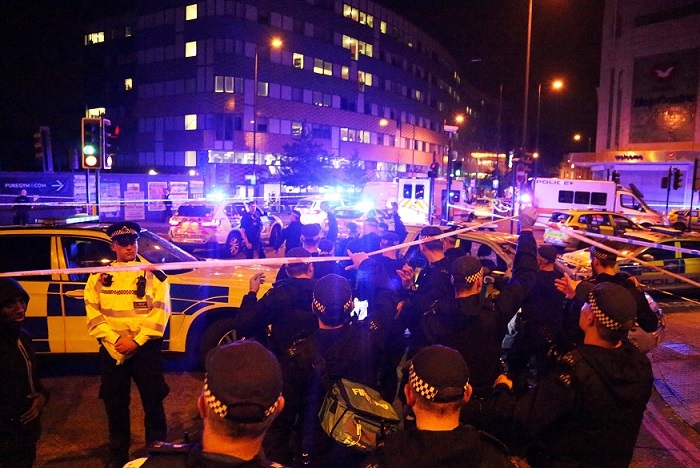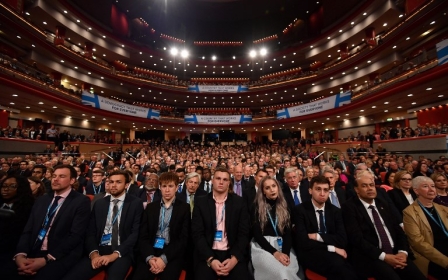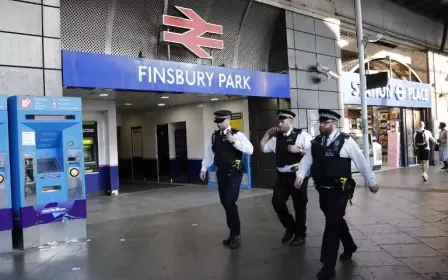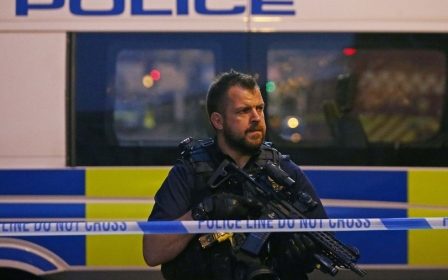After Finsbury: Time for the UK's right-wing press to address its Islamophobia

Words have consequences. They lead to actions. There was nothing remotely random about Sunday night's attack on the Muslim Welfare House in Finsbury Park when a white van ploughed into a group of worshippers as one of the attackers reportedly shouted: “I want to kill all Muslims.”
This event emerged from a dangerous environment where Muslims are fair game for insult, abuse and misrepresentation.
I know Muslims who endure insults and abuse on a daily basis when they go to work or to the shops. Very few non-Muslims have minded about this
Well over 100 mosques have been attacked in the last few years. I know Muslims who endure insults and abuse on a daily basis when they go to work or to the shops. Very few non-Muslims have minded about this.
Spectator columnist Rod Liddle says Islamophobia doesn’t exist because it isn’t a phobia. Hostility to Islam is rational, according to him.
Here’s Liddle, writing in the Spectator in 2015: "There is no such thing as Islamaphobia, of course. There are people who dislike Islam and will continue to dislike it no matter what fatuous legislation is enacted by the forthcoming Labour/SNP coalition from hell. And they dislike it for perfectly good, rational reasons."
Douglas Murray of the influential Henry Jackson Society (who responded to the Manchester attack with a call for "less Islam") agrees with Liddle.
Murray wrote in the Jewish Chronicle that it is "highly rational to be afraid of some, though not all, interpretations of Islam. It is rational to be afraid of a Salafist. It is irrational to be afraid of an Ahmadiyya. But there are far more Salafists in the world today than there are Ahmadiyya".
And here’s fellow Spectator writer Brendan O'Neill, editor of Spiked Online: "Islamaphobia is a myth. Sure, some folks in Europe and elsewhere no doubt dislike Muslims, just as other losers hate the Irish or blacks or women. But the idea that there is a climate of Islamaphobia, a culture of hot-headed, violent-minded hatred for Muslims, that could be awoken and unleashed by the next terror attack, is an invention."
Dangerous bilge
His colleague Tim Black agrees: "And yet the backlash, Islam's night and no doubt day of broken glass, never arrives. There never is an anti-Muslim pogrom. There never is a mass eruption of spitting, niqab-renting hatred. Some nasty graffiti and unpleasant tweets, yes; perhaps, lamentably, a fire at a mosque; and even the odd, isolated physical attack on Muslim for no other reason than the fact he or she is a Muslim. But the actual anti-Muslim backlash, the actual fulfilment of Islamaphobia proponents' wet nightmares, the actual mass assault on each and every Muslim.... it continues to lack reality."
I wonder. In the light of Finsbury Park, I seriously wonder. It’s time Tim Black retracts those ugly, lazy, stupid sentiments.
Charles Moore, former editor of the Daily Telegraph and former chairman of the massively influential Policy Exchange think tank, takes another line of argument. He believes that Islamaphobia is a construction invented in order to attract money from government.
This is what he wrote in the Spectator: "Muslim bodies attracting government grants obviously have an interest in there being as many incidents as possible, so that 'perception' tends to extend well beyond reality. If we must have these phobias, why not Sikhophobia and indeed, Christianophobia? Collection of these numbers would lead to the arrest of a lot of Muslims, so I suppose it is ruled out as being Islamaphobic."
Charles Moore has long been a hero of mine. He is a great stylist and was a wonderful Telegraph editor. But he talks dangerous bilge when it comes to Islam.
The question we must ask
I think it is beyond time to abandon the idea, beloved of right-wing political columnists, that there is no such thing as Islamophobia.
The idea has been unsustainable and morally wretched for years. The awful attack at the Muslim Welfare House in Finsbury Park makes it deeply offensive and contemptible.
We urgently need to consider whether there is a connection between the toleration of abusive public language about Muslims and actual physical attacks on the street
And we urgently need to go one step further and consider whether there is a connection between the toleration of abusive public language about Muslims and actual physical attacks on the streets.
Over the last few weeks, there has rightly been a great deal of criticism of the material spewed out by the Mail Online journalist, Katie Hopkins.
In the aftermath of the attack on the Manchester arena she called for a "final solution". It is impossible to conceive of a darker phrase.
Hopkins has apologised for this shameful tweet, and removed it, but her flow of ugly statements against Muslims continues.
Here is one recent case in point: "Western men. These are your wives. Your daughters. Your sons. Stand up. Rise up. Demand action. Do not carry on as normal. Cowed."
Can we connect this sort of language with events such as this week's attack in Finsbury Park? It is an important question, and it’s time we started to ask it.
Hopkins and Co
Bear in mind Hopkins is far from alone. She is in distinguished company.
In the wake of the attack on the Twin Towers on 9/11, Martin Amis, arguably our greatest novelist, told Ginny Dougary of the Times: "The Muslim community will have to suffer until it gets its house in order. What sort of suffering? Not letting them travel. Deportation - further down the road. Curtailing of freedoms. Strip-searching people who look like they're from the Middle East or from Pakistan. Discriminatory stuff, until it hurts the whole community and they start getting tough with their children."
It is very difficult to interpret these remarks as anything short of shocking. Yet there was relatively little condemnation of Amis. His friend, Ian McEwan, came to his defence.
Here is the Tory columnist, Bruce Anderson: "There are widespread fears that Muslim immigrants, reinforced by political pressure and, ultimately, by terrorism, will succeed where Islamic armies failed and change irrevocably the character of European civilisation."
Paralysis on Islamophobia
Some have warned that the attack on the Muslim Welfare House in Finsbury Park points the way to a hideous sectarian future where Muslim terrorists and right-wing fanatics lay into each other in a series of reprisal attacks.
I don't believe that will happen. Britain is a tolerant country.
However, I am sure we have failed to take seriously the problem of anti-Muslim hatred.
One bad Muslim is taken as a proxy for all Muslims, but one crazed, vicious white Englishman is not taken as proxy for all Englishmen
Successive British governments have acknowledged there's a problem with Islamist terrorism and have wisely set in motion strategies to address the problem.
They have repeatedly failed to deal with the problem of what you might call right-wing terrorism.
Here’s one very simple, telling example: in 2010, Sayeeda Warsi, then a minister, pressed for the setting up of a working group looking into anti-Muslim hatred. This turned into such a farce that both academics on the working group, Chris Allen and Matthew Godwin, resigned in despair. As Matthew Godwin scathingly explained:
"During a generally unpleasant four years, the basic message appeared to be that the government was simply not that interested in anti-Muslim hatred. In fact, to my knowledge, and despite increased concern over extremism and disillusionment among British Muslims, the government has still not undertaken any research into what causes Islamophobia and what might be done about it. How does the government hope to foster trust and support among communities if it does not appear to take their grievances seriously?"
The paralysis on Islamophobia contrasts with urgent action rightly set in motion on anti-Semitism. The government released a nearly 50-page pamphlet on their efforts to reduce anti-Semitism in 2014; no equivalent strategy has ever been published to my knowledge for Islamophobia.
New rules needed
There are urgent questions to be asked about our double standards. One bad Muslim is taken as a proxy for all Muslims, but one crazed, vicious white Englishman is not taken as proxy for all Englishmen.
Why aren’t we asking who radicalised the Finsbury Park attacker, and why they weren't reported by their community?
Why do we worry desperately about Islamist hate preachers, but not seem to care about hate preachers on the far-right. Tommy Robinson of the English Defence League was on breakfast TV within hours of the Finsbury attack. We need to contemplate new rules of public discourse.
For the last few years, I have been travelling around Britain as a commissioner for the Citizens Commission on Islam, Participation and Public Life. Our report comes out in two weeks.
We have heard harrowing accounts of the kind of intimidation and abuse that ordinary Muslims (all too often women) are obliged to endure.
And yet much too often, serious and influential people refuse to accept that any such thing as anti-Muslim bigotry exists. This week’s Queen’s Speech is a chance for Theresa May to change course.
Meanwhile, the moment has come for some of my colleagues (and, in some cases, friends) in the Conservative press to ask some deep, searching questions about their own use of language about Muslims and Islam.
- Peter Oborne won best commentary/blogging in 2017 and was named freelancer of the year in 2016 at the Online Media Awards for articles he wrote for Middle East Eye. He also was British Press Awards Columnist of the Year 2013. He resigned as chief political columnist of the Daily Telegraph in 2015. His books include The Triumph of the Political Class, The Rise of Political Lying, and Why the West is Wrong about Nuclear Iran.
The views expressed in this article belong to the author and do not necessarily reflect the editorial policy of Middle East Eye.
Photo: Police officers attend to the scene after a vehicle collided with pedestrians in the Finsbury Park neighbourhood of North London in 19 June 2017 (Reuters)
Middle East Eye propose une couverture et une analyse indépendantes et incomparables du Moyen-Orient, de l’Afrique du Nord et d’autres régions du monde. Pour en savoir plus sur la reprise de ce contenu et les frais qui s’appliquent, veuillez remplir ce formulaire [en anglais]. Pour en savoir plus sur MEE, cliquez ici [en anglais].





